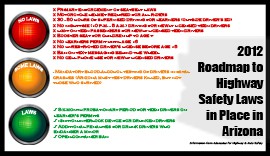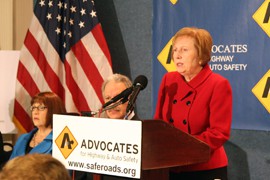Cronkite News has moved to a new home at cronkitenews.azpbs.org. Use this site to search archives from 2011 to May 2015. You can search the new site for current stories.
Report: Arizona has second-worst traffic-safety laws in the nation
WASHINGTON – Arizona got a failing grade Wednesday from a national highway safety group that said the state has adopted fewer than five of the 15 laws the group considers basic to traffic safety.
Only South Dakota ranked lower than Arizona in the ninth annual report from the Advocates for Highway and Auto Safety. It rated Arizona poorly for its failure to adopt strict laws on teen driving, seat belt and motorcycle helmet use, and distracted driving, among others.
Arizona has “some of the weakest laws and yet they’re surrounded by states that have better laws,” said Jacqueline Gillan, the group’s president. “This is really a call to action for Arizona to step up and start passing these laws.”
Her group said crashes killed more than 700 people in Arizona in 2010, at a cost estimated by state officials at $2.7 billion.
“It doesn’t make sense when you look at the economic cost and carnage on the Arizona highways that they are still ignoring some really effective public health interventions that could really bring down deaths and injuries and costs for the state,” Gillan said.
But state officials challenged the report, saying the laws it identified as crucial “aren’t going to help us.”
A report on the website of the Governor’s Office of Highway Safety says traffic deaths in Arizona of unrestrained vehicle occupants, alcohol-impaired drivers, motorcyclists without helmets and teen drivers all fell from 2006-2009. This in a state that does not have the strict laws for enforcing seat-belt use, requiring motorcycle helmets and restricting teen drivers that the highway safety group says are needed.
“We are following what our indicators are and pushing to do safety programs to save and prevent tragedies,” said Alberto Gutier, director of the Governor’s Office of Highway Safety. “We don’t have to consult or react to anything the rest of the country does.”
Gutier said traffic deaths across the nation have fallen steadily in recent years. That trend is mirrored in Arizona, where the number of highway fatalities went from 1,293 in 2006 to 807 in 2009, according to both the state and the National Highway Traffic Safety Administration. The number fell again to 762 in Arizona in 2010, according to the Advocates for Highway and Auto Safety report.
Gutier and Gillan agreed that part of the decline has been driven by the poor economy, which made gas relatively more expensive and resulted in fewer drivers on the road.
But Gutier said there are other factors, noting that Arizona was one of five states to earn a five-star ranking from Mothers Against Drunk Driving in a report released in November. That ranking was based on drunken driving countermeasures, such as ignition interlocks and sobriety checkpoints.
“Law enforcement has done a fantastic job in Arizona,” of enforcing laws already on the books, Gutier said.
The report by Gillan’s group did score Arizona relatively well for its drunken driving laws, noting that the state had almost all of the recommended restrictions: a ban on open containers, a requirement for ignition-interlock devices for drunken drivers and stiffened penalties for drunken drivers who endanger children. The state only got half-credit for its law requiring blood-alcohol tests on drivers killed in crashes; the report prefers that those tests also be required on drivers who survive crashes in which someone is killed.
Gutier said his office plans to allocate the majority of its funding to preventing traffic fatalities.
“I’m questioning the whole ranking and the whole report,” he said.
Ray “Still Ray” Fitzgerald, chairman of the 7,000 members Arizona Confederation of Motorcycle Clubs, said it would be difficult for state lawmakers to require that all motorcyclists wear a helmet, which the report would prefer.
Fitzgerald, a motorcyclist of more than 40 years, said motorcycle-rights organizations like his support a “pro-choice” stance on helmets. The Prescott resident said he wears a helmet when it snows.
“I’m not against wearing helmets, I’m against being told that I have to,” Fitzgerald said.








